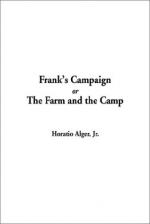Frank had not been idle. He had accompanied his father about the farm, and received as much practical instruction in the art of farming as the time would admit. He was naturally a quick learner, and now felt impelled by a double motive to prepare himself as well as possible to assume his new responsibilities. His first motive was, of course, to make up his father’s loss to the family, as far as it was possible for him to do so, but he was also desirous of showing Mrs. Roxana Mason and other ill-boding prophets that they had underrated his abilities.
The time came when Mr. Frost felt that he must leave his family. He had enlisted from preference in an old regiment, already in Virginia, some members of which had gone from Rossville. A number of recruits were to be forwarded to the camp on a certain day, and that day was now close at hand.
Let me introduce the reader to the farmhouse on the last evening for many months when they would be able to be together. They were all assembled about the fireplace. Mr. Frost sat in an armchair, holding Charlie in his lap—the privileged place of the youngest. Alice, with the air of a young woman, sat demurely by her father’s side on a cricket, while Maggie stood beside him, with one hand resting on his knee. Frank sat quietly beside his mother, as if already occupying the place which he was in future to hold as her counselor and protector.
Frank and his mother looked sober. They had not realized fully until this evening what it would be to part with the husband and father—how constantly they would miss him at the family meal and in the evening circle. Then there was the dreadful uncertainty of war. He might never return, or, if spared for that, it might be with broken constitution or the loss of a limb.
“If it hadn’t been for me,” Frank could not help thinking, “father would not now be going away. He would have stayed at home, and I could still go to school. It would have made a great difference to us, and the loss of one man could not affect the general result.”
A moment after his conscience rebuked him for harboring so selfish a thought.
“The country needs him more even than we do,” he said to himself. “It will be a hard trial to have him go, but it is our duty.”
“Will my little Charlie miss me when I am gone?” asked Mr. Frost of the chubby-faced boy who sat with great, round eyes peering into the fire, as if he were deeply engaged in thought.
“Won’t you take me with you, papa?” asked Charlie.
“What could you do if you were out there, my little boy?” asked the father, smiling.
“I’d shoot great big rebel with my gun,” said Charlie, waxing valiant.
“Your gun’s only a wooden one,” said Maggie, with an air of superior knowledge. “You couldn’t kill a rebel with that.”
“I’d kill ’em some,” persisted Charlie earnestly, evidently believing that a wooden gun differed from others not in kind, but in degree.




